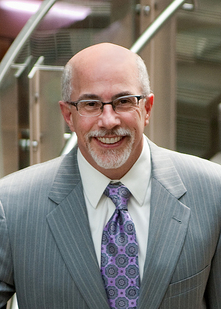Dec 5 2014
An ambitious Arizona State University project to validate health and wellness technologies in the clinic will be featured at the main stage of the world’s largest mobile health event in the world, the mHealth Summit.
 Michael Birt, director of the ASU Biodesign Institute's Center for Sustainable Health, will moderate the panel “Validating Clinical Data to Reinvent Medicine,” Dec. 10 in Maryland. Photo by: Center for Sustainable Health, Arizona State University
Michael Birt, director of the ASU Biodesign Institute's Center for Sustainable Health, will moderate the panel “Validating Clinical Data to Reinvent Medicine,” Dec. 10 in Maryland. Photo by: Center for Sustainable Health, Arizona State University
On Dec. 10 the ASU-led Project HoneyBee will be featured in a highly interactive panel, “Validating Clinical Data to Reinvent Medicine,” to explore how health systems can leverage the promise of continuous physiological measurement to pinpoint the transition from health to disease in order to improve outcomes and lower costs.
Confirmed panelists at the HoneyBee event include Bryan Sivak, chief technology officer of the U.S. Department of Health and Human Services; Michael Painter, senior program officer of the Robert Wood Johnson Foundation; Teri Pipe, dean of the College of Nursing and Health Innovation at ASU; Jim Levine, professor of medicine at Mayo Clinic, Arizona, and director of Obesity Solutions for the Mayo Clinic and Arizona State University; and Dan Dixon, vice president and chief community engagement officer for Providence Health and Services.
Michael Birt, director of the ASU Biodesign Institute's Center for Sustainable Health will moderate the discussion.
“With our ever-increasing and graying population, there is an enormous revolution in health care now possible that will empower the patient in their home environment through wearable, mobile devices and sensors,” said Birt. “But these devices need to be validated so that they're useful in the clinic.”
Wearable health and wellness devices are an emerging industry. A new IDC Health Insights report forecasts that U.S. clinical mobility spending will reach $5.4 billion by 2016, representing a 12.7 percent compound annual growth rate between 2011 and 2016.
There is also a tremendous movement to use wearable technology to improve clinical outcomes. Chief scientist for the Center for Sustainable Health and Nobel laureate Leland Hartwell estimates that when a patient is sent home from the hospital, roughly 15 to 20 percent of them return within 30 days. “And roughly 40 percent come back within six months, regardless of the original diagnosis. It’s pretty universal.”
To date, the Center for Sustainable Health has launched eight Observational Clinical Trials within Project HoneyBee, partnering with various local and national health care systems, including Mayo Clinic, Banner Health, Barrow Neurological Institute, Dignity Health, John C. Lincoln Hospital and Scottsdale Healthcare. The trials are designed to test the utility of commercial wearable devices for monitoring ambulatory patients, and are set to double next year.
Disease areas include heart disease, COPD, atrial fibrillation, patient mobility, gait monitoring in hydrocephalus and feasibility in diabetes patients. Each trial is specifically focused on validating wearable biosensors in a clinical population.
Validation of wearables will continue to be guided by clinical and economic drivers and analysis within the health care systems where they will be implemented. Importantly, the Project HoneyBee validation process is disease, device and outcome-agnostic, particularly one that can handle the large variety of devices for clinical settings.
A pivotal role will also be played by the private sector, both for companies developing biosensor technologies and those companies seeking to improve employee health and their own fiscal health through low-cost but highly effective technologies.
The panel discussion takes place from 9:20 to 10:20 a.m., Dec 10, at the Gaylord National Resort and Convention Center’s Potomac Ballroom in National Harbor, Maryland.